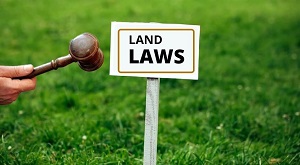How Much Does an Allodial Title Cost?
Last Updated on December 27, 2023
Written by CPA Alec Pow | Content Reviewed by ![]() CFA Alexander Popinker
CFA Alexander Popinker
The allodial title is that particular type of real property ownership that can be explained as keeping the land free from any sovereign or superior landlord. Practically, the owner of the land, being under an allodial title, will have full and absolute control over the whole property.
This means that they won’t be subject to acknowledgment, service, or rent to a higher authority. The allodial title is a concept that has as its roots the thought that you should have the right over your own land, without subjugation or other external types of interference.
You can find mentions of the concept of allodial titles as far back as the Middle Ages in Europe, especially in societies from Nordic and Germanic nations. In those times, land owned by freeholders, that weren’t subject to monarchs or feudal lords, wasn’t as uncommon as people think. This type of system for land ownership was very important in these societies and a lot of people held their lands in an allodial title.
The concept of allodial titles has, over time, become less common as the feudal system became more prominent in Europe. This idea, however, didn’t die out and instead, it was later brought by European settlers to the New World. As the allodial title symbolizes the independence and freedom that citizens want, it has become an essential part of the United States’ foundation.
The allodial title is, at least in today’s world, a very rare form of owning a property. In general, land is held more under a fee simple title or a system of feudal, where your absolute property rights will be under all kinds of obligations and restrictions.
Even so, this concept is still a very important concept as it is the ideal of independence from external control and property rights over your property. There are landowners that want to get allodial title over their property or assets as a way of getting full control and reducing governmental interference to a minimum.
How Much Does an Allodial Title Cost?
On average, the cost of the Allodial Title is somewhere between $2,400 and $15,000 or more, The requirements and general process to get the title will vary depending on the specifics of your property and your location.
Here’s a breakdown of the usual cost components to consider when pursuing Allodial Title:
- Legal fees to research property records and prepare necessary paperwork – $1,000 to $5,000
- Property survey to establish boundaries – $500 to $5,000
- Title search to verify ownership history – $500 to $2,000
- Recording fees to register Allodial Title – $50 to $500
- Appraisal for tax purposes – $300 to $1,000
- Taxes on property after Allodial Title – Varies greatly, could be eliminated or significantly reduced
There are also additional costs that you will have to consider. Some of these costs may be:
- Purchase of mineral rights and water rights
- Legal proceedings if title is contested
- Paying off any existing mortgages or liens
How to Get Allodial Title
1. General process
Research property history
Before you can establish an allodial title, you will first have to research the history of the property you have. This will usually include things like deeds, land patents, and historical records, that will be used to identify any potential claims against your property, as well as the chain of ownership.
You might also like our articles about the cost of land surveys, subdividing land, or the acquisition of an acre of land.
Establish true ownership
Once you have researched the history of the property, you will then have to establish true ownership over it. For this, you will have to go over rectifying discrepancies in property records and then clear any outstanding encumbrances or liens. Finally, you will have to demonstrate that that particular property has been held free from external obligations.
File for allodial title
Once the true ownership has been established, you, as a property owner, will be able to file for allodial title, by going to the appropriate governmental agency. This process isn’t the same under all common law jurisdictions, which is why you should go to a legal professional so that you find out the necessary steps that you will have to follow.
Getting an allodial title for a car
Obtain a Manufacturer’s Certificate of Origin (MCO)
The Manufacturer’s Certificate of Origin (MCO) is the document that the car manufacturer issues as proof of ownership for all new vehicles. Before you can obtain the allodial title for your car, you, as an owner, will have to get the MCO and then use it as evidence of absolute ownership.
Avoid registering the car with the state
When you register the car with the state, you will usually have to submit the MCO and transfer the full ownership to the state, which will then give you a certificate of title. You will only be able to establish an allodial title for your car if you avoid registering your vehicle with the state. In this way, you will keep the original MCO in your possession.
Create a private contract for ownership
You can also solidify the allodial title for your car by creating a private contract. This will be made to outline the full terms of ownership. You will have to detail all the rights, but also all the responsibilities of the owner in the contract, explicitly stating that the vehicle is under the allodial title.
2. Getting an allodial title for a house
Check property boundaries
 It is vital that you first verify the boundaries of the property before you can obtain an allodial title for your house. For this, you will have to get a land survey that will have to rectify discrepancies if any, and confirm the accuracy of the property description.
It is vital that you first verify the boundaries of the property before you can obtain an allodial title for your house. For this, you will have to get a land survey that will have to rectify discrepancies if any, and confirm the accuracy of the property description.
Pay off existing liens and mortgages
Homeowners under liens or mortgages for their properties won’t be able to apply for an allodial title. This is because this title is only obtainable for properties that are clear and free of outstanding obligations.
Obtain a land patent
Land patents are legal documents attesting the ownership of land and conveying it from the government to private individuals. You, as an owner, will first have to secure a land patent before you can obtain an allodial title for a house so that you can demonstrate your absolute ownership of the land.
Obtaining Allodial Title in Specific States
How to get an allodial title in California
If you are a property owner in California and you’re seeking to obtain an allodial title, you will have to apply for a land patent with the California State Archives. The archives will be able to give you information on the process you need to follow to obtain a plant patent for your specific property as they maintain records of all land patents for the state.
How to get an allodial title in Texas
As a property owner in Texas, you can obtain an allodial title by applying for a land patent with the GLO (Texas General Land Office). They are the ones that maintain records of land patents for the Texas state and will be able to guide you in the process of obtaining a land patent for your property.
Consult with a legal professional familiar with property laws
As property laws are very complex, regardless of the state in which you are living, it is very important to talk to a legal professional that is experienced in property laws of your particular state, so that you are sure you will obtain the allodial title as soon as possible. Attorneys are able to guide you through the whole process step by step and ensure that you’re on the right side of the law.
Critiques and Challenges of the Allodial Title
Conflicting claims to ownership
It will be challenging to establish the allodial title if there are conflicting claims to ownership. There are cases in which multiple parties will want to assert rights to a property and these disputes can only be resolved through time-consuming and costly processes.
Property taxes and other obligations
Although as a property owner, with an allodial title you will have absolute ownership, you might still be subject to different obligations like property taxes. As you will find it very hard to avoid responsibilities like property taxes completely, most professionals are against the pursuit of an allodial title as it will be rather impractical.
Legal complexities
Among the most important challenges people have with getting an allodial title is how complex the process will be. Navigating through the very complex property laws of each jurisdiction will be very difficult, especially for people that don’t have the needed specialized knowledge and don’t work with professionals. Also, you will need to do proper research into property history to establish allodial title and you will also need to go through the resolution of any outstanding liens or claims.
Conclusion
Although it is very uncommon nowadays in modern property ownership, you will still have to have a good understanding of the allodial title if you want to maximize control over your assets or land. The concept behind it is the idea that you can have complete property rights and full independence from external authority. This is very attractive for most property owners.
Keep in mind that even before considering the pursuit of an allodial title, you, as a property owner, should weigh both the benefits and drawbacks of this course of action. Although you will get better control and more independence when obtaining allodial title, you will also find that the process is not only very complex but also costly and time-consuming. And even if you finalize the process, you will still be subject to different obligations and taxes after establishing an allodial land.


if your not supposed to register your car for an allodial title, then how do you get a license plate.